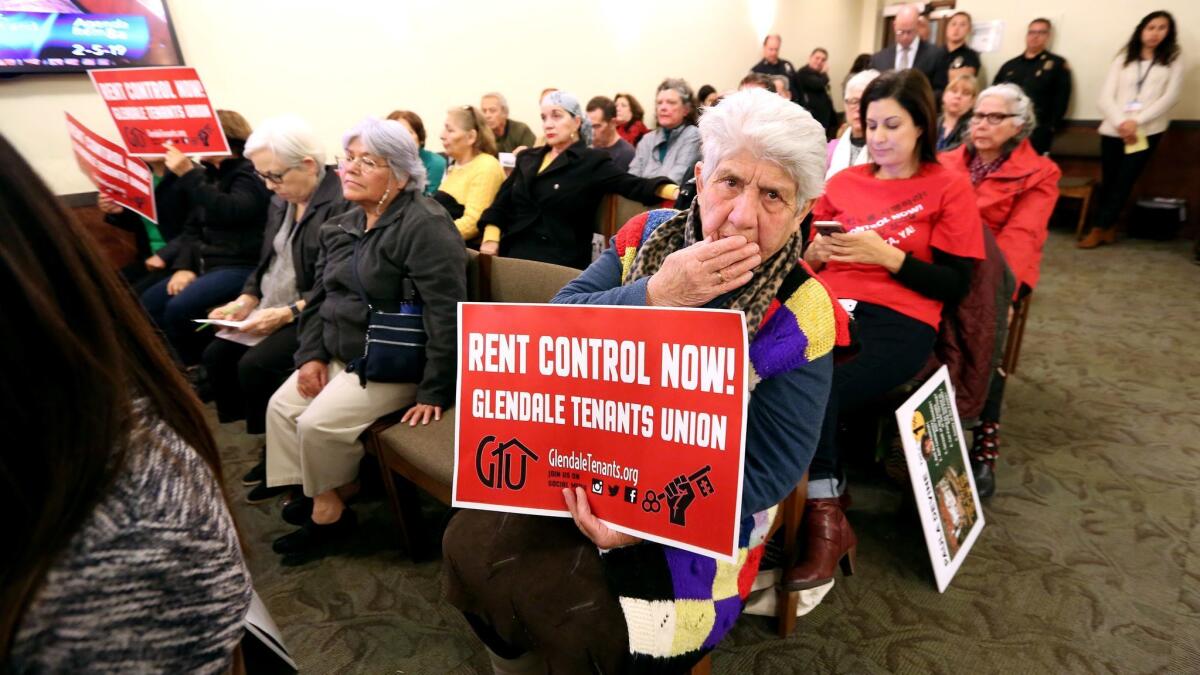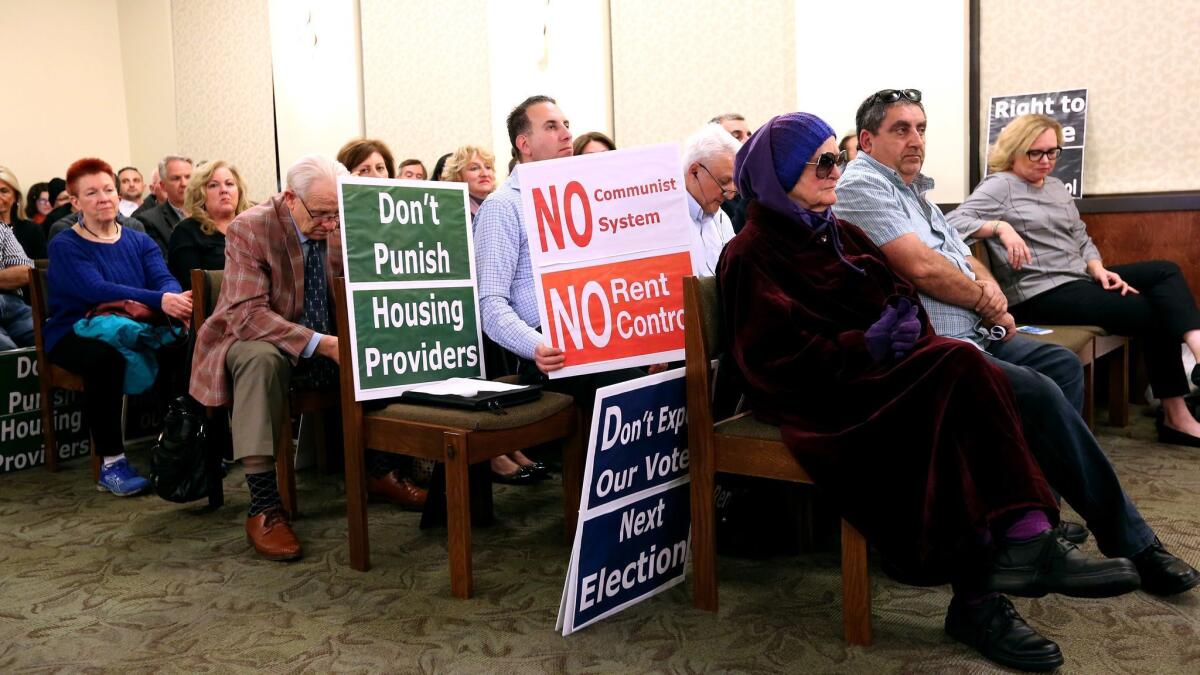Glendale landlords may soon have to limit annual rent increases to 7% or pay tenant relocation fees

- Share via
Glendale officials signaled Tuesday evening they would support a proposed ordinance requiring landlords to offer tenants a one-year lease and pay relocation fees if their rent is raised more than 7% annually and the tenant opts to leave.
A vote on the Right to Lease ordinance — the result of months of debate over how to address rising rents in the city that have sent some residents packing — is tentatively scheduled for next Tuesday.
“My goal is to help tenants and to do no harm to landlords, and I hope that that’s what I’m doing,” said Councilwoman Paula Devine, who said she would support a modified version of the ordinance despite opposition from both property owners and renters.
According to Devine, tenants benefit by living without the fear of multiple rent increases in a year. Landlords who have come before council claiming they generally raise rents by 5% or less per year will not be affected, she added.
In an unexpected twist, Mayor Zareh Sinanyan, who has supported rent control in the past, recused himself at the suggestion of City Atty. Michael Garcia.
Sinanyan was accused by a small group of people of violating a federal law prohibiting renter discrimination for saying Armenians are disproportionately affected by rising rents on an Armenian-language TV show, according to Sinanyan.
“The limits on free speech and the attempt to cut me out of the discussion based on these issues is ridiculous, a misinterpretation of law and nothing short of a sham,” Sinanyan said.
According to Sinanyan, he simply pointed out that increasing rents disproportionately impacts immigrant and elderly populations, including Armenians, who make up the largest renter demographic in the area.
City staff will likely determine whether Sinanyan can rejoin the discussion and vote on the ordinance by early next week.
Sinanyan wasn’t the only council member who had to vacate the dais during the discussion.
Since November, Councilman Ara Najarian has been barred by a federal agency overseeing conflict-of-interest laws from participating in all rent control discussions because he owns an interest in several apartment buildings in Glendale.
Outspoken over his dismay with the decision, Najarian said Tuesday he has divested from his property interests so he can rejoin discussions beginning in September. He offered his position before leaving the council chambers.
“I want everyone to know, I am completely against rent control,” he said.
The remaining council members directed staff to remove a portion of the proposed ordinance that would have required landlords and tenants to enter mandatory but nonbinding mediation if a tenant contested a rent hike exceeding 7%.
All three members also shot down a staff-proposed rental registry that would have required landlords and property owners to provide their contact information, as well as other information, such as the number of units they own and how much rent they charge.
Despite some pushback from property owners, City Council members maintained a provision that requires landlords offer tenants a new lease 120 days before the old one expires.
Tenants’ rights advocates voiced strong opposition to the proposed ordinance, arguing it fell short of their demands for rent control.
“It’s a distraction. It doesn’t actually provide meaningful support and protections for tenants, especially our elders, who are on such limited budgets,” said Jennifer Jameson, a member of the Glendale Tenants Union, adding that an acceptable compromise would be an extended rent freeze.
While some with property interests derided the proposed ordinance as rent control in sheep’s clothing, some seemed willing to accept it — with tweaks like removing the registry and mediation, as well as potentially lowering relocation fees.
Echoing several public speakers, Realtor Rick Barnes called it “too complicated, too long.”
As it is, a temporary freeze capping rent increases at 5% that was implemented in late November is set to expire at the end of this month. Landlords have already sent out rent increases above that cap set to take effect March 1, Garcia said.
If City Council members adopt the proposed Right to Lease ordinance next week with a four-fifth majority, it would go into effect immediately, subjecting those hikes to the new regulations.
If it passes with a lower threshold, it will go into effect on March 14. At that point, all rents would roll back to where they were on Sept. 18, according to Garcia, who called it a “delay, not a freeze.”
A similar ordinance was drafted and discussed in 2017 but was not adopted by the council.
Staff also sought direction on a potential renter subsidy program, including who and how many people would qualify and how much they would receive.
That discussion was moved to a later date, because the likely funding source — revenue from a recent tax hike known as Measure S — will not be available until July.

Twitter: @lila_seidman
